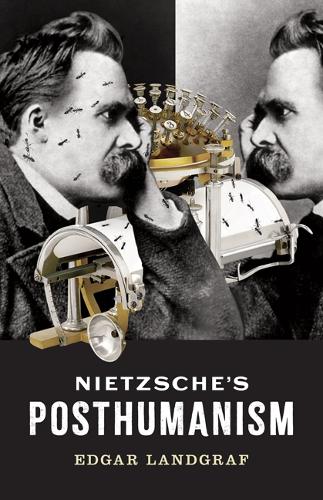
Nietzsche's Posthumanism
(Paperback)
Available Formats
Publishing Details
Nietzsche's Posthumanism
By (Author) Edgar Landgraf
University of Minnesota Press
University of Minnesota Press
3rd January 2024
United States
Classifications
Tertiary Education
Non Fiction
Impact of science and technology on society
193
Physical Properties
Paperback
280
Width 140mm, Height 216mm, Spine 13mm
454g
Description
A timely and trenchant commentary on the centrality of Nietzsches thought for our time
While many posthumanists claim Nietzsche as one of their own, rarely do they engage his philosophy in any real depth. Nietzsches Posthumanism addresses this need by exploring the continuities and disagreements between Nietzsches philosophy and contemporary posthumanism. Focusing specifically on Nietzsches reception of the life sciences of his day and his reflections on technologyresearch areas as central to Nietzsches work as they are to posthumanismEdgar Landgraf provides both fresh readings of Nietzsche and a critique of post- and transhumanist philosophies.
Through Landgrafs inquiry, lesser-known aspects of Nietzsches writings emerge, including the neurophysiological basis of his epistemology (which anticipates contemporary debates on embodiment), his concerns with insects and the emergent social properties they exhibit, and his reflections on the hominization and cultivation effects of technology. In the process, Landgraf challenges major commonplaces about Nietzsches philosophy, including the idea that his social theory asserts the rights of the strong, over the weak. The ethos of critical posthumanism also offers a new perspective on some of the key ethical and political contentions of Nietzsches writings.
Nietzsches Posthumanism presents a uniquely framed introduction to tenets of Nietzsches thought and major trends in posthumanism, making it an essential exploration for anyone invested in Nietzsche and his contemporary relevance, and in posthumanism and its genealogy.
Reviews
"Nietzsches Posthumanism is a timely, lucid, and incisive commentary on the problematic centrality of Nietzsches thought for our time. It shows the continued potential that Nietzsches writings have for navigating a way through the dangers and excesses of contemporary posthumanist politics. In doing so, Edgar Landgrafs critical posthumanist stance produces fresh readings of both Nietzsche and posthumanist philosophies."Stefan Herbrechter, University of Heidelberg
"Edgar Landgrafs Nietzsches Posthumanism is a fantastic book. Through the lens of Nietzsches philosophy, Landgraf offers a fresh perspective on contemporary debates on posthumanism and its many variants, engaging with key thinkers in science and technology studies, new materialism, and biopolitics, including Foucault, Maturana and Varela, Deleuze and Guattari, Haraway, Braidotti and Esposito. Landgraf draws on thorough research and engagement with Nietzsche's texts, shedding new light on aspects of Nietzsches philosophy that are perhaps less known, such as his writing on insects. Nietzsche's Posthumanism asks what we can learn from swarms and hives about human ethics and politics. I highly recommend it!"Vanessa Lemm, author of Homo Natura and Nietzsche's Animal Philosophy
Author Bio
Edgar Landgraf is professor of German at Bowling Green State University. He is author of Improvisation as Art: Conceptual Challenges, Historical Perspectives and coeditor of Posthumanism in the Age of Humanism and Play in the Age of Goethe.
